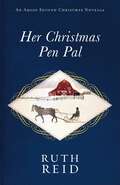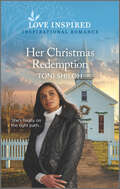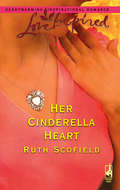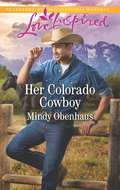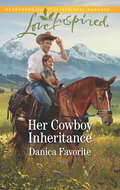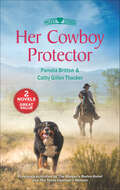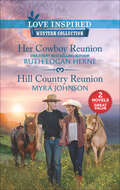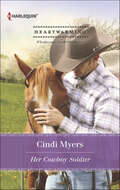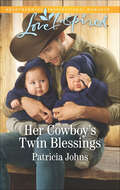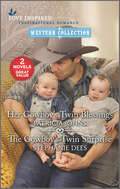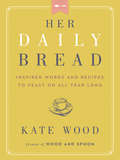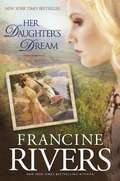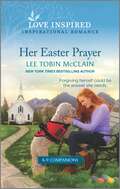- Table View
- List View
Her Christmas Hero
by Lorraine BeattyA Small-Town Christmas Gemma Butler has a grand vision to transform the fledgling Christmas celebrations in Dover, Mississippi, and bring visitors to the town. It's also the single mom's last chance to provide for her son and revive her event planning business. But Gemma's not the only one with something to prove. Line Montgomery has the weight of the family business on his shoulders. And he'll go down swinging before he'll let anyone disrupt the traditions he holds dear. Yet when a storm threatens to destroy the holiday, he'll join forces with the beautiful planner and discover she just might be the love he's been searching for.
Her Christmas Homecoming: An Uplifting Inspirational Romance
by Lindsay HarrelWill a reunion between them Be the gift they need this holiday? Planning a small-town Christmas festival with her ex-boyfriend is not what corporate executive Georgia Carrington expects when she returns home to care for her grandmother. After all, there&’s a promotion waiting in New York City, and Mayor Nate Griggs only reminds her of her broken heart. Now a widowed father, Nate is hesitant to depend on the woman who left him behind thirteen years ago, but he needs her help to secure the future of the town&’s youth center. Soon they&’re bringing joy to the community—and to each other. But as the holiday deadline grows closer, will they choose a future together?From Love Inspired: Uplifting stories of faith, forgiveness and hope.
Her Christmas Pen Pal: An Amish Second Christmas Novella (Amish Second Christmas Novellas)
by Ruth ReidJoy was expecting a wedding proposal from Henry; what she got instead was news of another woman. But when her heartfelt letter to a cousin ends up in the hands of a young cabinetmaker, an unexpected correspondence between two strangers gets interesting fast.
Her Christmas Protector
by Terri ReedA cowboy and his Oregon ranch provide a safe haven at Christmas for a woman on the run in this inspirational romantic suspense novel.“If I can’t have you, no one will.”Those words from her abusive ex-husband sent Faith Delange fleeing from everything familiar. And when a bus dropped her off in the small town of Sisters, Oregon, Faith immediately found room, board and a job on an isolated ranch. But she couldn’t tell her handsome new boss, Luke Campbell, what had her jumping at shadows during the joy of the holiday season—or what kept her out of his arms. She’d only put his and his frail mother’s lives at stake. Faith feared her past would never let her go. But neither would Luke.
Her Christmas Redemption: An Uplifting Inspirational Romance
by Toni ShilohCan she find a second chance… on a town&’s holiday wish list? Organizing her church&’s Christmas Wishes program is the perfect start to Vivian Dupre&’s new life—one without the shame of her recent mistakes. But as she grows closer to co-coordinator Michael Wood, she&’s even more determined to keep her past hidden. Together they can give joy to their small town. But when Michael discovers her secret, will he be willing to grant Vivian&’s holiday wish—forgiveness?From Love Inspired: Uplifting stories of faith, forgiveness and hope.
Her Christmas Secret: An Uplifting Inspirational Romance
by Gabrielle MeyerHer life was right on track Until her past came knocking… Nothing ever rattles school principal Valerie Wilmington…until the child she gave up a decade ago, and allowed her mother to raise, now becomes her responsibility. Valerie wants desperately to be a good mom but struggles to connect with the daughter she barely knows. She finds solace in the contractor and single dad hired to renovate her school, Wade Griffin. As their children become fast friends, Wade helps Valerie navigate her new family&’s first Christmas. But Wade&’s been lied to before, and Valerie&’s secret will change everything…From Love Inspired: Uplifting stories of faith, forgiveness and hope.
Her Cinderella Heart
by Ruth ScofieldShy schoolteacher Cassie Manning had never been in love. After literally stumbling over new parishioner Peter Scott at New Beginnings Church, Cassie was certain God had answered her prayers! Handsome, worldly and a man of faith, Peter seemed to be everything Cassie could want in a soul mate. And the look in his summer-sky eyes told her he might care for her, as well. But when he disappeared for days at a time mysteriously, she began to worry about her newfound Prince Charming. Will this sweet Cinderella ever get her happily-ever-after?
Her Colorado Cowboy: The Amish Spinster's Courtship The Rancher's Legacy Her Colorado Cowboy (Rocky Mountain Heroes #3)
by Mindy ObenhausLassoing the single mom’s heart…A Rocky Mountain Heroes storySocialite Lily Davis agrees to take her children riding…despite her fear of horses. But now widowed cowboy Noah Stephens is determined to help her get comfortable in the saddle. And, at her children’s insistence, Lily finds herself promoting his rodeo school. As Noah and Lily work together, will Noah continue to shield his heart…or can they discover a love that conquers both their fears?
Her Convenient Cowboy
by Lacy WilliamsDo You Take This Cowboy? A blizzard traps rancher Davy White in his family's secluded cabin with Rose Evans...and she's nine months pregnant! Help is miles away, and Davy must work to keep them both alive. As the storm rages outside, he comes to care for the vulnerable widow. Enough that he's willing to offer her his name-against his family's objections. Rose will do anything for her baby, but she's recently widowed. She doesn't know if she can trust the feelings she has toward Davy. And she refuses to come between him and his family. But the more time they spend together, the less she can resist the comforting, caring cowboy. Wyoming Legacy: United by family, destined for love
Her Cowboy Deputy
by Lacy WilliamsStranded! Bear Creek sheriff's deputy Matt White is used to being the rescuer, not the rescued. But now the hurt lawman's marooned on Catherine Poole's remote homestead. The little girl he'd known briefly as a child is all grown up-and tugging at his heart. Isolated from the world around her, Catherine's spent her whole life caring for her ailing grandfather. The last thing she needs is a cowboy stranded in her home. Let alone the memories he dredges up of a past she's tried to put behind her. But can this deputy be her chance to finally move forward and find true happiness?
Her Cowboy Hero
by Carolyne AarsenSecond-Chance Cowboy Montana rodeo star Tanner Fortier is a good man. A man Keira Bannister never stopped loving. But when he shows up at Refuge Ranch looking to have his late brother's saddle repaired in time for the championships, he's the last person Keira wants to see. For years, she's kept hidden the real reason for breaking their engagement-and Tanner's heart. But now, with him at the ranch, she's tempted to reveal the truth-one that could destroy him. But she knows that to have a future with the man of her dreams, she has to settle the past... Refuge Ranch: Where a Montana family comes home to love.Montana rodeo star Tanner Fortier is a good man. A man Keira Bannister never stopped loving. But when he shows up at Refuge Ranch looking to have his late brother's saddle repaired in time for the championships, he's the last person Keira wants to see. For years, she's kept hidden the real reason for breaking their engagement-and Tanner's heart. But now, with him at the ranch, she's tempted to reveal the truth- one that could destroy him. But she knows that to have a future with the man of her dreams, she has to settle the past... Refuge Ranch: Where a Montana family comes home to love.
Her Cowboy Inheritance: Her Amish Child Her Cowboy Inheritance The Marriage Bargain (Three Sisters Ranch #1)
by Danica FavoriteWhen a widowed mom inherits a Colorado ranch with her sisters, it brings a new start—and, just maybe, a new love . . .Inheriting a ranch with her two sisters is the fresh start young mother Leah Holloway desperately needs. The problem? Leah knows nothing about ranching. And the only person willing to teach her is Shane Jackson, the handsome and oh-so-infuriating cowboy next door.Trusting each other means they’ll risk everything—including a connection that might just blossom into something dangerously real . . .
Her Cowboy Protector
by Cathy Gillen Thacker Pamela BrittonFind your Happily Ever After with two feel-good stories of dogs unleashing romance in small-town settings.RESISTING HER RESCUERThe Ranger’s Rodeo Rebel by Pamela BrittonUnder the guise of taking over the family’s rodeo act, former army ranger Chance Reynolds is actually home to protect their star trick rider, Carolina Cruthers, from her ex. Keeping an eye on the fearless blonde isn’t tough. Keeping things professional? That’s tougher. As life on the rodeo trail draws them closer, what started as a short-term arrangement is becoming something more. Can Chance convince Caro that they should team up forever?The Texas Lawman’s Woman by Cathy Gillen ThackerThanks to her scheming ex-husband, Shelley Meyerson is about to lose her home. The last person she wants to turn to is deputy sheriff Colt McCabe, the guy who broke her heart in high school. True, the handsome lawman seems to genuinely care about Shelley and her little boy. But learning to trust again is hard. Especially when Colt’s been keeping a secret that could cost him his badge…
Her Cowboy Reunion (Shepherd's Crossing)
by Ruth Logan HerneA new life...an old love Can she risk loving him again in Shepherd’s Crossing?With her family in disgrace, Lizzie Fitzgerald never imagined she’d end up at an Idaho ranch. Fortunately, she’s working with horses she loves—even if it means dealing with her old sweetheart Heath Caufield. The widowed father of an adorable boy, Heath hasn’t forgiven Lizzie for their past. But even a stubborn cowboy can’t stop the heart’s ability to forgive...or love again.
Her Cowboy Reunion and Hill Country Reunion (Western Collection)
by Ruth Logan Herne Myra JohnsonHer Cowboy Reunion by Ruth Logan HerneWith her family in disgrace, Lizzie Fitzgerald never imagined she’d end up at an Idaho ranch. She loves working with the horses—even if it means dealing with her old sweetheart Heath Caufield. The widowed father of an adorable boy, Heath hasn’t forgiven Lizzie for their past. But even a stubborn cowboy can’t stop the heart’s ability to forgive…or love again.Hill Country Reunion by Myra JohnsonVeterinarian Tripp Willoughby thought keeping his chronic illness a secret was the right thing to do—but he ended up breaking his college girlfriend’s heart. Diana Matthews has a new life now, and she’s reluctant to accept Tripp’s help with her pet therapy program. As they work together, Tripp remembers how things used to be with Diana—and is convinced he must find a way to win her back.USA TODAY Bestselling Author Ruth Logan Herne
Her Cowboy Soldier
by Cindi MyersCan she open her heart?The Hartland Herald isn’t exactly the big leagues. But for army widow Amy Marshall it’s the first step to a career that will allow her to support her young daughter and start a new life in the city. Unfortunately, writing a story that will get her noticed requires stepping on a few toes. Josh Scofield’s toes, to be exact.Sure, her article was less than flattering. She probably shouldn’t have suggested the injured veteran got his teaching position unfairly, but a real reporter can’t pull punches. And she hadn’t pegged the former military man as someone who cared what other people thought.As she digs deeper, though, Amy realizes there’s more to Josh than just a good story. But it will be hard to win his trust, and is there any point when she doesn’t plan on sticking around?
Her Cowboy Till Christmas (Wyoming Sweethearts #1)
by Jill KemererCan a Christmastime reunion last forever? First in the Wyoming Sweethearts series from the author of The Cowboy’s Little Secret.She’s only home for the holidays . . . Can he convince her to stay?The last person rancher Mason Fanning ever expects to see again is the girl who once broke his heart. Brittany Green is in town for Christmas and trying to convince her ailing grandmother—the only maternal figure the widower’s little boy has left—to move away. Can Mason show her all she really needs to fulfill her dreams is right here in Wyoming?
Her Cowboy's Twin Blessings (Montana Twins #1)
by Patricia JohnsTwo stubborn hearts. One ranch.Could Montana Twins unite them?With orphaned twin infants to care for, Casey Courtright hoped to buy the ranch he works on—but he can’t match Ember Reed’s offer. Nevertheless, Casey agrees to show Ember the land she plans to use for her therapy center, but only if she’ll help him with the babies. And as the twins draw them together, Casey might just find that Ember is his perfect partner.
Her Cowboy's Twin Blessings and The Cowboy's Twin Surprise
by Patricia Johns Stephanie DeesCan twin babies unite them?Her Cowboy’s Twin Blessings by Patricia JohnsWith orphaned twin infants to care for, Casey Courtright hoped to buy the ranch he works on—but he can’t match Ember Reed’s offer. Nevertheless, Casey agrees to show Ember the land she plans to use for her therapy center, but only if she’ll help him with the babies. And as the twins draw them together, Casey might just find that Ember is his perfect partner.The Cowboy’s Twin Surprise by Stephanie DeesDespite his too-rowdy past, former rodeo star Devin Cole’s stunned when the woman he married after a whirlwind romance shows up pregnant with his twins…demanding a divorce. He convinces barrel rider Lacey Jenkins to give him six months to show her he’s changed. But proving he can be a champion husband and father is the hardest—and most important—challenge he’s ever faced.
Her Daddy's Eyes
by Gary E. ParkerShe had black eyes just like her daddy who she did not know since she was a little girl. Now after seeing a picture of him and also having other happenings that pointed her towards him, she was driven to find him. Were all the happenings pushing her to try to find him God's work or just coincidences? What would finding him tell her?
Her Daily Bread: Inspired Words and Recipes to Feast on All Year Long
by Kate Wood“Kate’s heart for food and people warm every page… truly, a comforting read for anyone with an appetite for loving others well.”– Bob Goff, New York Times bestselling author of Dream Big and Live in GraceFrom the writer and photographer behind the award-winning Wood and Spoon blog comes a 365-day devotional, featuring daily reflections and 52 delicious recipes that will nourish the body and soul throughout the year.In the midst of her busy schedule, Kate Wood, award-winning blogger behind Wood and Spoon and mother of three, realized that she was surviving, but not thriving, and that what she needed more than another cup of coffee was real connection with herself, with others, and with God. At the table, there’s an invitation to serve, connect, and give deeply of ourselves, and Kate invites us to join her at that table through the pages of this daily devotional. Like a conversation with a good friend, each day offers the chance to reflect, go deeper into scripture, and receive the encouragement you need. Kate also shares treasured family recipes, including:• Mom’s Homemade Bread• Two-Bite Crab Cakes with Lemon Dill Aioli• Cheddar Cornmeal Chicken Pot Pie• Simple Pesto Risotto• Weekday Red Velvet Cake• Birthday Sprinkle Pancakes• Fluffernutter Pretzel PieFind a comfy chair, grab a cup of coffee, and settle into these words that offer encouragement, connection, and hope.
Her Darkest Secret
by Jessica R. PatchWhen a cold-case serial killer returns, FBI special agent Fiona Kelly has one last chance to stop him before he claims the prize he&’s always wanted—her. The sight of a goose feather at a murder scene modeled after a children&’s poem is enough to make FBI special agent Fiona Kelly's blood turn to ice. Almost two decades ago, a feather was left with her sister's body—and with every subsequent victim of the Nursery Rhyme Killer. Now he's back. Only this time, his latest gruesome murder is a message to the only one who ever got away: Fiona. Finding &“Rhyme&” is an obsession that's fueled Fiona's career—and destroyed her marriage to fellow FBI agent Asa Kodiak. Now Fiona and Asa have to put their past tensions aside and work together one last time. But Rhyme is watching, and catching this killer may force Fiona to reveal her biggest, darkest secret…the one only he knows.&“Her Darkest Secret by Jessica R. Patch grabbed me in the first scene of this edge-of-your-seat suspense and didn't let go until the end!&”—Patricia Bradley, author of the Memphis Cold Case novels
Her Daughter’s Dream (Marta’s Legacy Series Book #2)
by Francine RiversBack Cover: “In the dramatic conclusion to the Marta's Legacy series, Marta's granddaughter, Carolyn, comes of age during the turbulent 1960s, struggling to navigate a tense family life. Though college offers a taste of freedom, tragedy shatters Carolyn's confidence and she disappears into the heady counterculture of San Francisco. When she reemerges two years later, more lost than ever, she reluctantly turns to her family to help rebuild a life for herself and her own daughter, May Flower Dawn. “Familiar tensions emerge when Dawn develops a closer bond with her grandmother than her own mother. As she struggles to avoid the mistakes of those who went before her, Dawn vows to become a bridge between the women in her family rather than the wall that separates them forever.” The author emphasizes Christian themes such as forgiveness, reconciliation, and repentance as the way to solve these problems.
Her Duty Bound Defender (Mountain Country K-9 Unit #2)
by Sharee StoverThreatened and falsely accused… She&’ll need this K-9&’s protection. Only seconds after widowed mother-to-be Naomi Carr-Cavanaugh is rescued from two masked gunmen, she&’s accused of multiple murders. Detective Bennett Ford believes he&’s finally apprehended the Rocky Mountain Killer—until Naomi is attacked again. Now she must rely on Bennett and his K-9 partner for protection. But with threats closing in, she&’ll have to prove her innocence first in order to stay alive…From Love Inspired Suspense: Courage. Danger. Faith.Mountain Country K-9 Unit Book 1: Baby Protection Mission by Laura ScottBook 2: Her Duty Bound Defender by Sharee StoverBook 3: Chasing Justice by Valerie HansenBook 4: Crime Scene Secrets by Maggie K. BlackBook 5: Montana Abduction Rescue by Jodie BaileyBook 6: Trail of Threats by Jessica R. Patch
Her Easter Prayer: An Uplifting Inspirational Romance (K-9 Companions #4)
by Lee Tobin McClainForgiving herself could be the answer she needs…in this novel by New York Times bestselling author Lee Tobin McClain. While recovering from the past… Can she hope for a new future? After a tragic loss, reading teacher Emily Carver dedicates her life to educating troubled boys with the help of service dog Lady. Tutoring new school handyman Dev McCarthy&’s struggling son reminds Emily of everything she&’s missing. Time spent with them could heal her heart—only, Dev has a secret. Can she see past what he&’s hiding to the family forming around her?From Love Inspired: Uplifting stories of faith, forgiveness and hope.K-9 Companions Book 1: Their Unbreakable Bond by Deb KastnerBook 2: Finding Her Way Back by Lisa CarterBook 3: The Veteran's Vow by Jill LynnBook 4: Her Easter Prayer by Lee Tobin McClainBook 5: Earning Her Trust by Brenda MintonBook 6: Guarding His Secret by Jill KemererBook 7: An Unlikely Alliance by Toni Shiloh


